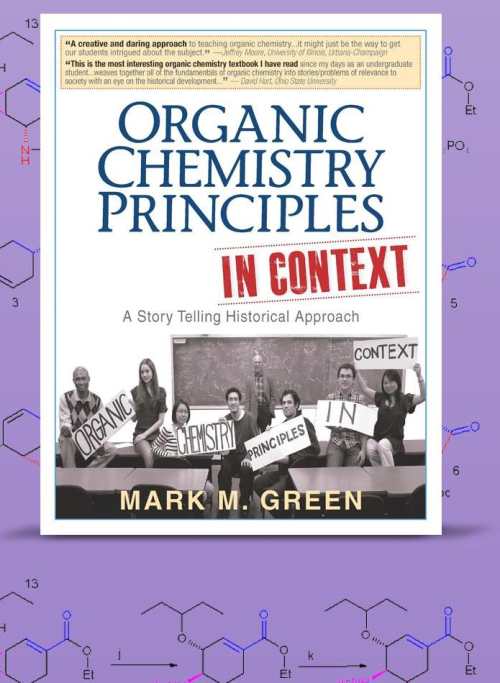Textbooks Too Expensive? Chem Prof's Indie Book Rethinks the Formula
At first blush, it’s hard to figure out why the concept of self-published textbooks seems unusual. Then you glance through the nearest university bookstore. The logos of McGraw-Hill and Prentice Hall dominate shelves, red and blue flags firmly planted on the spines of hundreds of math and engineering tomes. The land of written knowledge is the property of a handful of companies, and few publishing professors venture beyond its borders.
But of the few that do, Dr. Mark Green is at the forefront.

Mark is a professor at NYU Polytechnic, and no stranger to publishing both in and out of the mainstream. His self-published chemistry textbook, Organic Chemistry Principles In Context, has garnered praise from all corners of the chemistry field. His colleagues have discussed its novel approach to introducing this traditionally brain-twisting field of study: while introducing chemistry’s building blocks, Mark also describes the lives and achievements of its celebrities. From jazz-loving Melvin Newman to the church-burning antics of Jean-Baptiste Biot, Mark associates faces (and quirky stories) with chemical processes that students might otherwise find somewhat dry.
“Science depends on compelling narratives,” Mark explains. He feels that students are most likely to gain an interest in chemistry through storytelling. “The protagonist doesn’t have to be human.”
Textbook Prices a Crushing Burden
But sustaining that interest in chemistry can become more challenging as students progress in their studies, and not just because the work gets harder. Affording textbooks is becoming a crushing burden. According to the College Board, the cost of books alone reliably lands somewhere between $1,500 and $2,200 per year. In fact, the Government Accountability Office estimates that the price of textbooks rose 82 percent between 2002 and 2013, and there’s no end in sight. Plenty of professors are worried about this trend. Mark’s concern about the cost of textbooks was the primary factor in his decision to publish his own book.
The decision may be a philosophical one, but Mark is dead serious. In fact, early on in his book’s life, a large academic publisher offered him a contract, but Mark decided to pass. As a result, Organic Chemistry Principles In Context costs $10 on a Kindle and $22.50 in paperback, compared to mainstream textbooks that feature price tags upward of $250. Even rental costs can top $50 for some staple texts.
Strong-Armed Into New Editions
But the pitfalls of the mainstream textbooks industry don’t just catch the people who buy them. For writers and professors, there are some serious dangers in going with a mainstream publisher, one of which wouldn’t be out-of-place in an episode of The Sopranos. As we spoke, Mark recalled a friend who had published his textbook with a publishing company. Soon after that book was published, this friend was ordered to finish another edition of the textbook—an edition that, he insisted, wasn’t necessary. But the publisher wasn’t hearing any protests. If he, the expert, wouldn’t write the book, they’d just hire someone else and use his name. Would the new writer be as good? Would they even have the right background? It was impossible to know. “The publisher had the copyright,” explains Mark. The book was theirs—still is—and they can do whatever they want with it. They can make a new edition every six months, hire a high school student to do the writing, put a pink elephant on the cover. The only certainty was that if the new edition was bad, it was Mark’s friend whose reputation would be ruined, not the publisher’s.
Mark recalls a time when years would go by with the same textbooks being handed down again and again to class after class of college students through the medium of used bookstores. Back then, it was recognized that introductions to chemistry just don’t change that much in a single year. Barring a major new discovery into the nature of the universe, there just wasn’t any need to write new editions so quickly. Forcing students to buy new books every year was just crazy. As Mark has watched cascading editions become standard practice in educational publishing, he’s become alarmed at how the model has changed. “New editions are arising simply to kill the used textbook market,” he points out. It’s bad for everybody but the publishing company.
Self-publishing Organic Chemistry Principles in Context not only gave Mark control over the price of the book, but over the copyright. He’s philosophically committed to not writing new editions unless they’re necessary. Considering the historical perspective he takes in the book, it’s possible to see it remaining relevant for a long time—at least, once teachers take a chance on an untraditional textbook model.
Attitudes To Indies Changing
Nature Chemistry hit the nail on the head when they called Mark’s book “fascinating” and “a dramatic change to the landscape of textbook choice.”
Organic Chemistry in Context may be an outlier now, but considering Mark’s success, it may have more than a small future. He tells me about a slow, cautious shift in attitude among his colleagues. There’s interest, but also apprehension. Despite all of its issues, the old model is a known quantity, and many professors may quail at the possibility of facing the world without the protection of a publisher. But slowly, self-publishing is becoming a serious consideration among a few adventurous academics, and as new alternative publishing options open up, more may join them.
Maybe if independent textbook publishing really takes off, mainstream textbook prices will start to dive back to affordable levels as major publishers face their first real competition in decades. It’s a big idea, but exists within the realm of possibility: someday, pioneers like Mark Green might just change the publishing world.
Anna Call
